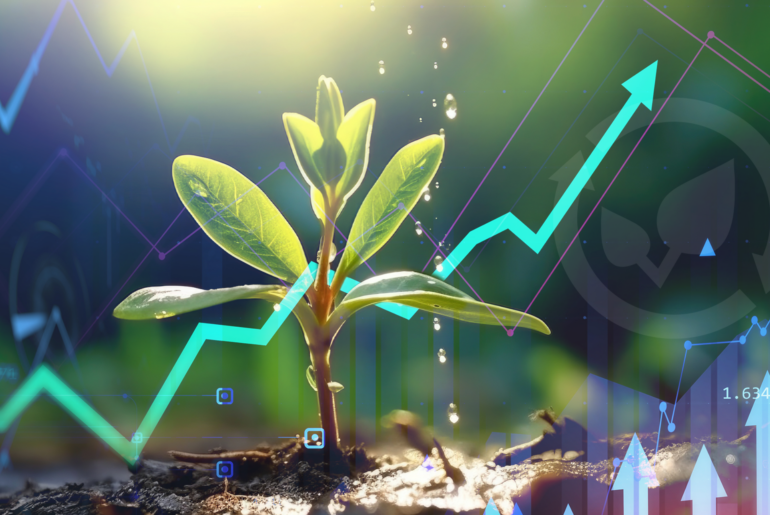As more and more organizations are advancing on their sustainable transformation journey, their efforts are becoming increasingly complex. Sustainability considerations are becoming more integrated in different functions, and ESG (Environmental & Social Governance) performance must be monitored and reported more continuously. IT has become a critical enabler of these transformations as ESG performance monitoring and management process has evolved from an entirely manual exercise to a much more data-intensive process, necessitating the integration of large-scale data models and management platforms.
Since their maturity levels regarding sustainable transformation are generally still relatively low, many organizations also require a significant amount of help from professional services providers regarding their sustainable business and IT strategy setting, reporting, implementation of enabling technologies, etc. This has led to numerous partnerships between professional services and IT providers that have created joint solutions and go-to-market strategies focusing on generating positive financial and non-financial ROIs for their clients and helping them up to speed on their sustainability journey. Recent IDC data shows that many organizations still struggle with a lack of understanding of available sustainability-focused IT, and with making tangible progress in solving the ESG data challenge. This, in hand with professional services firm’s lack of proven tech-enabled sustainability services, has led to users taking smaller, less impactful steps in their sustainable transformations, thus lengthening the time to transform, and increasing resource costs.
Despite the recent political backlash against ESG, the topic remains a top business priority for business decision-makers globally. For instance, we asked the following question in our annual Future of Industry Ecosystems global survey: considering the collective capital among your partners (people, financial, asset, operational), what are the most important collaborative initiatives? The top answer for three years running, whether you are a CxO (CEO, CIO, CTO, CFO, CDO), business line manager, IT leader, supply chain, or customer-facing executive, is sustainability, or environmental, social, governance (ESG). Organizations want to and need to work closely with ecosystem partners in support of ESG because this is too complex an issue to address on their own.
In support of these efforts, IDC believes that major global organizations that typically orchestrate industry ecosystems will increasingly form cross-ecosystem teams dedicated to ESG activities and task them with facilitating the resulting sustainable practices throughout the ecosystem and their organizations. In our 2023 Future of Industry Ecosystems FutureScape, we predicted that organizations would begin to build sustainability teams consisting of ecosystem partners: By 2025, 60% of G2000 organizations form cross-ecosystem ESG teams that are accountable for sharing of data, applications, operations, and expertise that facilitates sustainable ecosystem practices. Our recent research shows that this approach is well on its way.
Forming dynamic and reconfigurable cross-ecosystem teams that can quickly adapt new business demands to their industry environment promotes trust, cooperation, and solidarity among industry ecosystem participants. Further, working on ESG within an ecosystem consortium enables companies to collaborate with partners, suppliers, advisors, and regulators in the development, tracking and management of industry-specific standards, performance metrics, and targets. Having a cross-ecosystem team dedicated to the stewardship of ESG standards and practices allows partners to not only share development costs and risks but also address issues with a united front and communicate clearly to all stakeholders.
The Most Advanced With Ecosystems Are Most Advanced With ESG
In our Future of Industry Ecosystems MaturityScape Benchmark report (April 2023), we asked about the ecosystem maturity approach with environmental sustainability, and what this entails. An analysis of survivors (those at levels 1 or 2) and thrivers (those at levels 4 or 5) shows that thrivers go one step beyond meeting regularly with partners to ensure sustainability; they create formal teams of leaders across the ecosystem, that share data, applications, operations, expertise, and knowledge as needed to advance their approach to environmental sustainability.
Collaboration With Industry Ecosystem Partners for ESG a Critical Focus
Which statement best describes your organization’s environmental sustainability strategy and approach to your industry ecosystem?

2024 Multi-Client ESG Ecosystems Research Study
During the first half of 2024, IDC will be fielding a study on ESG best practices and plans with ecosystem partners, including a perception element of current IT and services providers. We are currently accepting sponsors of this study – which we will look to for guidance on the questions and topics that matter most to you and your business. Contact us to learn more: jhojlo@idc.com, bstengel@idc.com, dversace@idc.com
Contributing authors: Dan Versace and Bjoern Stengel




